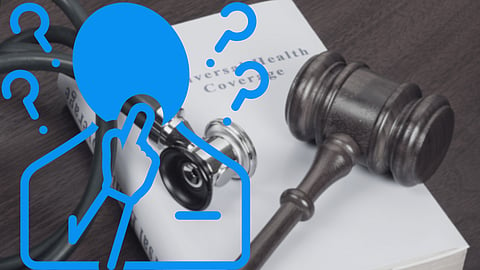SLR on NHI – Foreign influencers and private companies: A concerning trend in South Africa
In a must-read opinion column, SLR raises concerns about foreign influencers and private companies in South Africa's healthcare and elections with potentially concerning hidden political agendas and lack of public participation, potentially leading to voter apathy. London-based think-tank Chatham House's support for South Africa's National Health Insurance (NHI) raises questions about foreign interference. Rob Yates, an advocate for NHI, believes it is a viable option despite potential impact on doctor-patient relationships. Meanwhile, the Independent Electoral Commission (IEC) partnering with private companies like Meta, Google, TikTok, and Media Monitoring Africa to tackle disinformation during the 2024 election sparks concerns about biases and lack of public participation. With funding links between Chatham House, MMA, and Africa Check, associated with Open Society and Pierre Omidyar, questions arise about hidden political agendas. Opposition parties' silence suggests foreign NGOs may be overstepping their boundaries, potentially leading to voter apathy.
Sign up for your early morning brew of the BizNews Insider to keep you up to speed with the content that matters. The newsletter will land in your inbox at 5:30am weekdays. Register here.
The season for noses being stuck in
By Simon Lincoln-Reader
You might not know the name Rob Yates, but you should. He's the London- think-tank Chatham House's man insofar as National Health Insurance (NHI) in South Africa is concerned. Rob, being an arch public health-ist, was long on the whole coof thing, believes NHI is a great idea (he claimed, in 2019, we 'had more than enough money for it') and wants us 'to get over ourselves' and just do the bloody thing. Splendid advice – but only if you're one of the neckbeards who attended the launch of Salim Karim's book, a delightful novel that blends his affection for science fiction with some soft pornography.
Chatham House is an established influencer, and Rob's little nudge would have been appreciated by the ANC (perhaps atonement for hosting Julius Malema on a fundraising junket in 2015?). But what for the rest of you? How do you feel about an English academic sticking his nose into something that may impact your own doctor/patient relationship?
Well, apparently it's the season for noses being stuck in – so get used to it. On the 3rd of July, the Independent Electoral Commission (IEC) announced that it had struck up deals with Meta, Google, TikTok and a local non-profit called 'Media Monitoring Africa' to 'curb disinformation in the run-up to and during South Africa's 2024 election'. Admittedly this isn't Zuckerbucks – Mark Zuckerberg's donation of $350m to government vote-counting facilities in 2020, which, despite being allowed to proceed was declared by a judge as 'having the appearance of impropriety' – but it is another case of private companies, swamped with documented, political moderation biases, establishing a seasonal pop-up without any public participation.
If you look at who funds Chatham House in a certain bracket of donations, you'll find the same organisation that funds MMA, which, funnily enough, is the same organisation that also funds Africa Check, whose cute little local psyop is now over a decade old – and was first called out by Dr. Frans Cronje. It's virtually forbidden to mention the names 'Open Society' or 'Pierre Omidyar', but the fact is these people donate a vast amount of money to agitate change that is attached to a distinct political order, which they make no effort to hide anymore. Omidyar's own media project, The Intercept, refused to publish information that it judged would adversely affect the prospects of the Democrat candidate in 2020 – then later also revealed the identities of whistleblowers to authorities ('snitches get stitche…d up').
Take a look at the Instagram account of the nepo baby who recently inherited Open Society from his father. Alex Soros is a political groupie who has already visited the White House over a dozen times in 2022 / 2023 and whilst its always nice for young men to feed old men custard on a spoon and well done and so on, the organisation he has inherited is not an elected institution nor does it boast any democratic mandate (incidentally, the Bill and Melinda Gates Foundation also fund Chatham House, which you'll no doubt find re-assuring).
What happens when Silicon Valley and moneyed groups with an agenda converge? An example unraveled a few months ago, when Bloomberg reported that one of Jacob Zuma's tearaways, Duduzile, was central to a social media disinformation campaign involving the war in Ukraine – Duduzile being a fan of Vladimir Putin, not so much the other guy. But upon deeper inspection, you find that the woman representing the organisation who made the announcement, Nina Jankowicz, has repeatedly circulated demonstrably false information herself.
In a country where it is essential people vote, a particularly rotten choice lends toward apathy: if you begin to suspect the game is rigged, or are forced into discerning the lesser of two rotters, the likely outcome is surrender and withdrawal – its much more rewarding installing ZoZo huts. That there has been silence from opposition parties regarding the respective announcements of Rob Yates and the IEC is troubling, and points to the larger, lesser-spoken scope creep of foreign NGOs over the years coming to squat. If you really want to solve a problem like this, you introduce a customised version of the UK's sexual offenders registry – and force the organisations to redeem themselves by working backward. Not so enthused about another country's private affairs now are we?
Follow SLR on Twitter: @SiLincolnReader
Read also:

